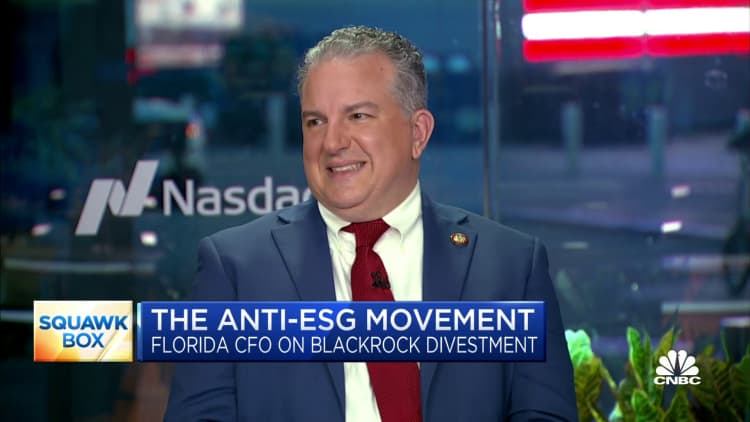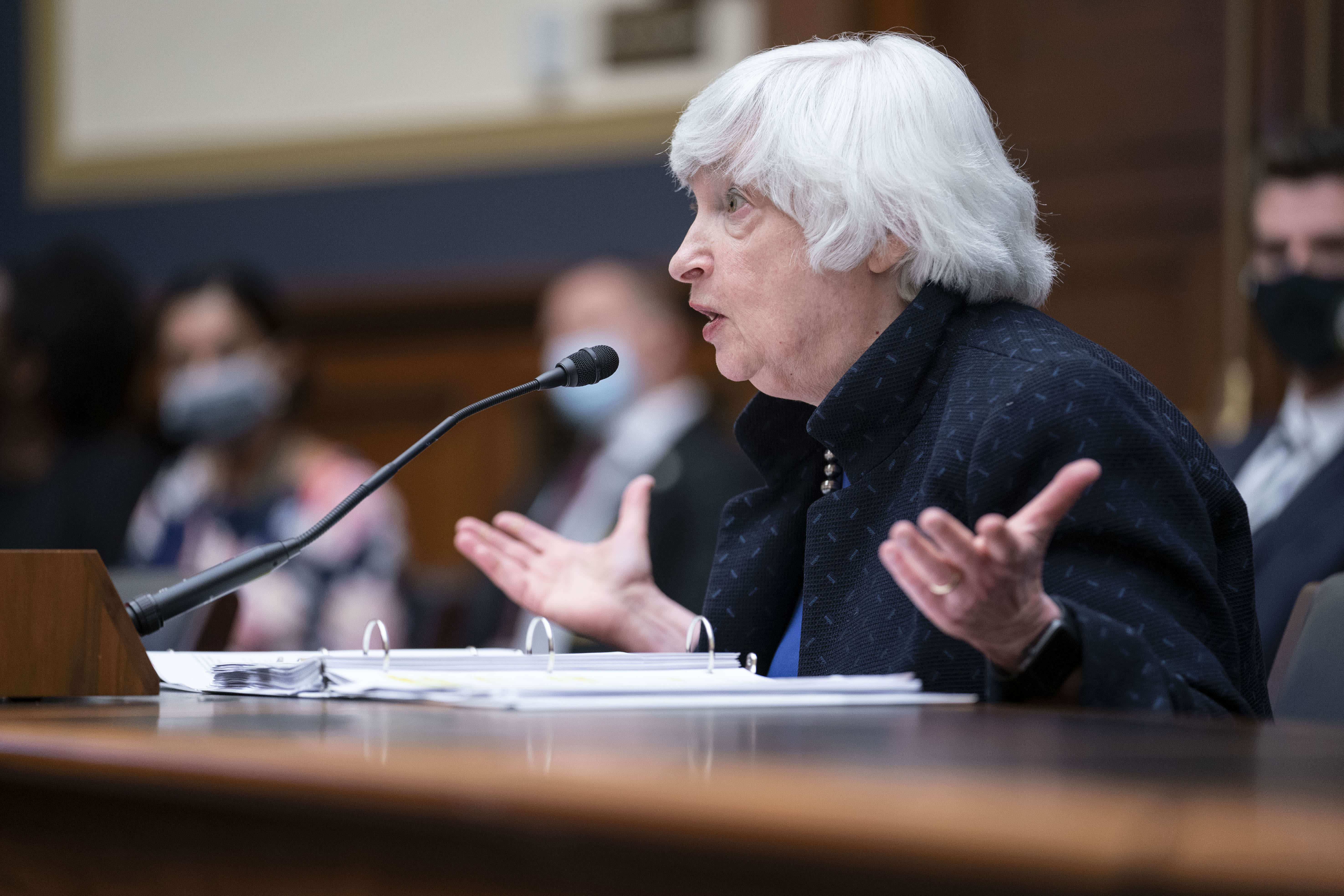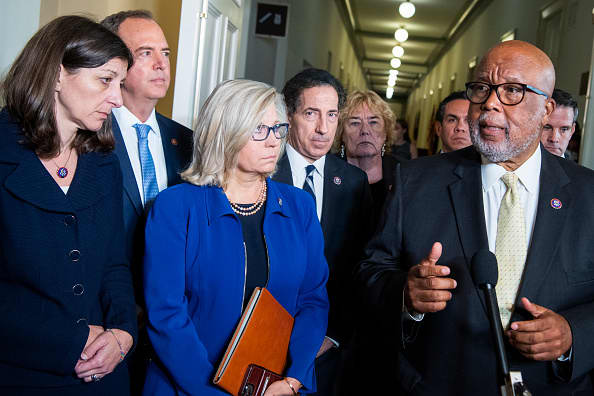How Trump allies and wealthy donors helped to fuel the GOP fight against ESG investing platforms
The GOP fight against ESG investing at firms like BlackRock has ties to allies of former President Trump, wealthy Republican donors and state treasurers.

A protester holds a sign during a youth climate strike outside of the BlackRock offices on December 06, 2019 in San Francisco, California.
Justin Sullivan | Getty Images
A group of Republican state financial officers gathered last February at a Hyatt hotel in downtown New Orleans to take aim at one of the party's corporate enemies: BlackRock CEO Larry Fink.
One panel hosted by Republican Utah Treasurer Marlo Oaks posed a question increasingly uttered by congressional Republicans and and prospective GOP presidential candidates in recent months, according to an agenda obtained by the Center for Media and Democracy and later reviewed by CNBC.
The panel's description asked: "Who's more important: shareholders or stakeholders? Is the 'stakeholder capitalism' being sold by Larry Fink and other investors really stakeholder politics?"
The conference was organized by the conservative leaning State Financial Officers Foundation, a tax exempt 501(c)(3) nonprofit group that does not publicly disclose its donors. The group is at the center of a growing network of organizations aligned with pockets of the Republican Party that have grown more comfortable criticizing investing firms such as BlackRock, Vanguard and State Street for what critics call politically motivated investing plans.
A year after the panel in New Orleans, incoming House GOP committee chairs and GOP White House hopefuls such as former President Donald Trump and Florida Gov. Ron DeSantis have put Wall Street's environmental, social and governance investing policies near the top of their political hit lists. The Senate is set to vote Wednesday on a measure to block the Biden administration from allowing retirement plans to consider ESG factors in their investments.
More than a half dozen conservative groups have helped to drive the criticism of Wall Street's ESG investing methods — and some have little-known ties to longtime conservative donors or lawyers who have aided Trump himself.
Members of the State Financial Officers Foundations are all powerful state Republican officials, many of whom have scrutinized ESG practices or pulled back billions of dollars from investing firms. They include Oaks, who last year announced he would move $100 million in state funds from BlackRock to other money managers, and Florida's GOP Chief Financial Officer Jimmy Patronis, who in December said the state treasury would pull out $2 billion in assets previously managed by BlackRock.
A representative for the State Financial Officers Foundation did not return a request for comment.

Behind the scenes, a larger network of conservative interest groups is helping to fund the organization's events or send representatives to attend.
Conservative leaning groups including the 1792 Exchange, the Heritage Foundation, Consumers' Research, American Legislative Exchange Council and Mercatus Center, were among the attendees of the private February meeting of the State Financial Officers Foundation in New Orleans, according to the attendee list reviewed by CNBC.
Some of those organizations participated in a similar State Financial Officers Foundation gathering in Washington D.C. in November 2022, according to an agenda. The meeting in D.C. focused, in part, on pushing back on ESG investment standards. The foundation announced at the time a targeted ESG campaign that features a website and an initial six-figure digital marketing effort.
One of the organizations that attended last February is the 1792 Exchange, a nonprofit sponsor of the State Financial Officers Foundation. The group, which has become a key player in the anti-ESG movement, has ties to key Trump allies.
The 1792 Exchange says it intends to "develop policy and resources to protect and equip non-profits, small businesses and philanthropy from 'woke' corporations to educate Congress and stakeholder organizations about the dangers of ESG (environmental, social, and governance) policies." Critics have deployed the vague term "woke capitalism" in response to a broad range of stances taken by corporations that they see as too beholden to liberal politics.
The organization recently published an online index that grades over 1,000 companies on "policies, practices, and other relevant criteria to determine the likelihood a company will cancel a contract or client, or boycott, divest, or deny services based on views or beliefs." The companies that the group has given a critical "high risk" grade include BlackRock, Vanguard and State Street.
The 1792 Exchange does not report on its website who its founders are, and the group's president, Paul Fitzpatrick, would not reveal the identity of those who formed the organization.
Nathan Estruth, a former vice president at Procter & Gamble, said this year that he was a co-founder of the 1792 Exchange. Estruth was among the group's representatives at the State Financial Officers Foundation's February 2022 national meeting in New Orleans.
Estruth has played a varied role in GOP politics in recent years. He ran a failed bid to become lieutenant governor of Ohio in 2018. He has also given money to conservative groups, including a $10,000 donation last year to the Women Speak Out PAC, a super PAC and partner of the anti-abortion group Susan B. Anthony Pro-Life America.
Records show the 1792 Exchange also has early ties to Cleta Mitchell, an attorney who worked with Trump as he tried to overturn the 2020 presidential election, and Ken Blackwell, a Republican former Ohio secretary of state. Fitzpatrick told CNBC that neither Mitchell nor Blackwell have a current role with the 1792 Exchange.
In 2021, Mitchell was listed as secretary and Blackwell as director of Constitutional Congress Inc., the name by which the 1792 Exchange was previously known, according to financial forms filed to the Internal Revenue Service and obtained by CNBC. The original group, which said it focused on educating the public and lawmakers about the Constitution, changed its name to the 1792 Exchange last year and shifted its focus to fighting corporate policies, according to Delaware state business records.
"Constitutional Congress was formed to educate officials and citizens on various issues, and the 1792 Exchange carries on that mission but it is giving attention to retiree and also shareholder issues," Fitzpatrick told CNBC.
Fitzpatrick, who provided CNBC with the group's 2021 forms filed with the IRS, did not offer its 2022 documents because they have not been filed yet.
Both Mitchell and Blackwell have ties to Trump's efforts to spread conspiracies about the 2020 election. Mitchell worked on the former president's scheme to overturn 2020 state election results.
Meanwhile, Blackwell is the chair of the Trump-aligned America First Policy Institute's Center for Election Integrity, which was created after Trump's failed attempt to get reelected in 2020. It has challenged the integrity of the U.S. election system. He was also part of Trump's controversial Presidential Advisory Commission on Election Integrity, which the former president created shortly after the 2016 election.
Mitchell declined to answer questions to CNBC when asked about her role with Constitutional Congress, and instead ripped this reporter, falsely claiming in an email that he has "never done a single story that isn't a hit piece against conservatives."
Blackwell did not return requests for comment.
The sources of anti-ESG funding
A growing list of Republican donors, including other Trump allies, along with a massive donor advisory fund have helped to provide funding for the anti-ESG fight.
The State Financial Officers Foundation itself raised $911,000 in 2021, according to its latest public 990 forms filed with the IRS. An archived webpage from September 2022 shows Consumers' Research was a "diamond sponsor" of the group.
It counts the 1792 Exchange as a "gold sponsor," which give $50,000 and receive benefits like access to exclusive events and a column in an e-newsletter, according to Responsible Investor. The Heritage Foundation, meanwhile, is a "silver sponsor."
Other previously listed sponsors of the State Financial Officers Foundation include Mastercard, H&R Block, Visa, Fidelity and JPMorgan Chase. Mastercard, Fidelity, Visa and JPMorgan Chase all promote their own sustainability investment models. None of these companies returned a request for comment.
Tax-exempt 501(c)(3) groups such as Consumers' Research and the 1792 Exchange are not required to release their donors. However, documents and news reports offer some clues into who has contributed to those organizations.
Along with sponsoring the financial officers group, Consumers' Research has also spearheaded attacks against ESG and run multimillion-dollar ad campaigns against BlackRock, including by highlighting the firm's business dealings with China.
Consumers' Research received a multimillion-dollar investment from a nonprofit called Marble Freedom Trust, according to the Wall Street Journal. The group aims to finance the fight against corporate ESG activities, according to the Journal.
Marble Freedom Trust is led by former Trump judicial advisor Leonard Leo, who helped to coordinate campaigns to confirm the former president's Supreme Court nominees. The group received a $1.6 billion donation in 2021 from Barre Seid, an electronics manufacturing mogul, according to The New York Times.
Meanwhile, Constitutional Congress, the precursor to the 1792 Exchange, raised $225,000 in 2021 from anonymous donors. At least one previous donor to the group could offer a clue into who is funding the organization as it becomes a key player in the anti-ESG movement.
The National Christian Charitable Foundation, which acts as a donor advisory fund, says on a 990 form that it funneled $6,000 to Constitutional Congress in 2017. A search through ProPublica's nonprofit database shows only the National Christian Charitable Foundation as a donor to Constitutional Congress and does not list any other contributors. The group received other undisclosed donations, including in 2021.
The foundation acts a donor advisory fund for contributors who want to use it to finance other organizations but remain anonymous. The National Christian Charitable Foundation gives out thousands of contributions annually: it raised more than $3 billion and donated $1.5 billion in 2021, according to a 990 form posted on its website.
When asked about the contribution to Constitutional Congress, a spokesman for the advisory fund, Steve Chapman said the group often does not know the intent of donors.
"Unfortunately we don't know the specific purpose of most every grant that NCF distributes, and we don't in this case," he said.

 Konoly
Konoly 
































